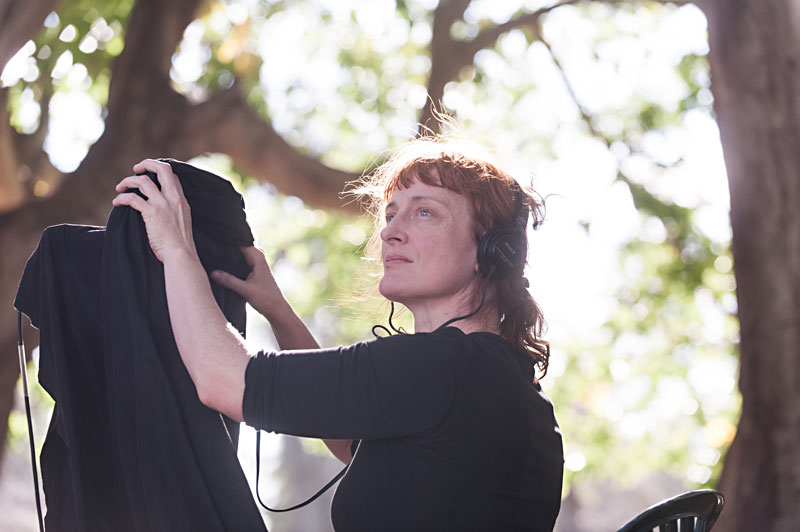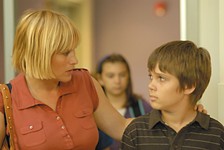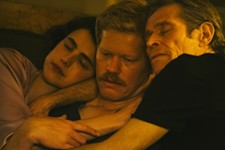The Babadook Director Sings a Song of History With The Nightingale
Jennifer Kent honors a commitment to the Aboriginal people of Australia
By Richard Whittaker, Fri., Aug. 9, 2019
The colonial history of Australia is one of blood and horror. With her new film The Nightingale, writer/director Jennifer Kent has attempted to tell not just the stories of the white settlers who invaded or the convicts dumped there, but also the Aboriginal peoples oppressed, butchered, and thrown from their lands. However, her first commitment was to ensure that the story was true to their experiences. If it hadn't been, she said, "I would have felt like I was colonizing them all over again."
Kent's film has thematic links to her 2014 breakout horror, The Babadook – not least in its depiction of how extreme grief shapes us. In Tasmania in 1825, an Irish convict, Clare (Aisling Franciosi), and an Aboriginal guide, Billy (Baykali Ganambarr), set out to wreak a bloody revenge on the British Army soldiers who have debased and abused them. It's not a story Kent would have expected to tell. "I don't really like period films," she said. "I don't like that they have a fastidious attention to costume and design, at the expense of the humans onscreen." Her real aim was to create something "that sat more in a mythical realm. I don't mean that it was untrue, but that it took on a universality. In setting the film in the past, I was able to put it in a world that wasn't of the here and now, but was of its own making – but that I felt very freeing."
But this did not mean abandoning historical accuracy. Instead, she consulted with many researchers, including a military expert and an Irish cultural historian, to find both period details and contemporary resonances (as well as a sexual clinical psychologist, who advised on the film's disturbing rape sequences). "I remember my first session with the army historian," said Kent. "It was so brutal, but I took it all on board."
Ultimately, she said, "I see [The Nightingale] as a war film more than a period film." That could be why it evokes a particular moment in Australian cinema, between the late 1970s and early 1980s, when Australia's own cruel history and position on the global stage was explored in films like historic martial narratives Gallipoli and Breaker Morant. For Kent, the greatest challenge – and obligation – was in depicting the underrecorded and underrepresented history of Aboriginal Australians. That's where one of the era's most pointed dramas came in: The Chant of Jimmie Blacksmith. Fred Schepisi's 1978 film was an adaptation of Thomas Keneally's fictionalized version of the life of Jimmy Governor, an indigenous man whose murder of nine white settlers over six days in 1900 has become a cultural flash point in Australian history. She described the film as "running in the background" of The Nightingale and pivotal to her own film. "I think the fact it got made allowed this film to get made. I think people could see the potential in it."
Schepisi's film was a game changer, because it treated Aboriginal characters as rounded and from a distinct culture. By contrast, Kent said, "There were films made in Australia in the past that were made without consultation or collaboration, and I don't think that's acceptable anymore." Case in point: Nicolas Roeg's seminal outback drama, 1971's Walkabout, which reduced its indigenous characters to mystical ciphers. "It's a masterpiece," said Kent, "[but] in terms of the Aboriginal content, I don't buy it, and I think now you couldn't get away with it – or you shouldn't be allowed to."
Kent noted that Screen Australia – the federal agency responsible for promoting and supporting film production – has become proactive in helping filmmakers work with Aboriginal people, but she wanted to go even further. That's why the most meaningful collaboration was with the Tasmanian Aboriginal people, and most especially "Uncle" Jim Everett, a writer and elder of the clan plangermairreenner in Northern Tasmania. Without his involvement, Kent said she doubted the film could have worked. "I would have abandoned it," she said, but Everett's involvement convinced her to move forward. "He said to me, 'This is a shared story.'" However, he wasn't just another expert, another brain to pick for authenticity: She worked through the story with him, and he would consult with other elders at the Tasmanian Aboriginal Centre to ensure that what was shown was authentic. "Jim was a representative of a larger body of Aboriginal people, so everything had to be taken through Jim to his people, and then back through Jim to me. So it was a very considered process."
If that sounds like a lot of work, it was. But for Kent, it was a vital part of the storytelling. "It shouldn't be easy for white filmmakers to make stories about Aboriginal people. There should be a process."
Inevitably, the film has caused controversy – for its unflinching depiction of rape, of genocide, of the abuse of convicts by the colonial forces, and of the evils upon which modern Australia was built. "People don't like being presented with the dark side in cinema at the moment," Kent said, noting that people will lash out "whether it's an attack on their history, or examining things that are not easily digested." The reaction can be brutal – while The Chant of Jimmie Blacksmith has become a cinematic landmark, it was a box office washout, and Schipisi was so disheartened by the response that he left Australia. However, for Kent that's no reason to not tell these stories. "I'm not making this stuff up to offend people. It's part of my country's history, so I felt a great responsibility to tell it accurately."
Austin Chronicle: There are few worse experiences for a filmmaker than to be, say, with historians dissecting the period details of their film.
Jennifer Kent: For example, no one knows exactly what [contemporary Aboriginal people] wore. It's likely, Jim says, that they were nude and wore skins that they draped, but they didn't wear clothing. But there's a lot of shame around nudity now, with the culture, and so he made the decision – and I supported it – to clothe these people, to a certain extent, so the actors felt comfortable, and we were as close to history as we could get without putting things onscreen that were sending out the wrong message.
So it's a fine line, but it was always dictated by Jim and his people, and his community. Everything, from Billy's ochre (for his body art), to his songs. Jim developed the words, and Baykali gave us his music from his songs, from his mob, up north. So it was a beautiful thing to see that come together, and my involvement with the Aboriginal people on the film, and with Jim, is one of the most precious experiences of my life. Being an Australian, it's incredibly meaningful for me, and it's a rarity for white Australians to have any insight into the culture. I feel very fortunate to have had that.
AC: This is Baykali's first major role: How did he come on board?
JK: We went up north, because the Tasmanian Aboriginal people, it's a very small community and a lot of them are very light skinned, so Jim accepted and supported the idea that we look up north for cultures that were still quite separate from white society. So we went to East Arnhem Land which is where a lot of remote communities are and people are still living traditionally. With his blessing, and the Tasmanian Aboriginal people's blessing, I went there and stayed in the community.
It was a slightly different process of auditioning than we would do with the other character, but I wanted to and had to go into those communities, and meet the elders there, talk with them about the Tasmanian story and about the Tasmanian mobs, and tell them about what we were doing and why we were doing it.
Baykali's from Galiwinku, which is an island off the top of Australia. He flew in to do the audition, and he was very sincere. He read the script, he loved it, he understood its importance, and when he started to act I went, "Wow, he really has something." We did a lot of work with him in rehearsals, improvisations with Aisling that were really great. Then, very early on in the shooting, he was very nervous in the first scene. But then after that he just flew, and he's a born actor. He's part of a dance troupe that's pretty famous in Australia called Djuki Mala, and he knew what it meant to tell a story. He had the sensitivity and the emotional intelligence to go there, and he was an absolute find.
AC: At the same time as being honest about the Aboriginal culture, you're dealing with people being sent from England and Ireland as convicts for the most trivial of offenses.
JK: It was a time when poverty was seen as a moral weakness, and that was a message that was brought down from on high, from royalty downwards – that poor people deserved what they got. One of my concerns of the film was empathy. In our modern world, I feel that's vanishing, which disturbs me, and in that time too, there was not a lot of empathy. To be able to transport people and make them work seven days a week, 18 hours a day, with no pay, and work them until they died, was not a particularly evolved society, and I wanted to look at what that looked like.
Australians have a habit of romanticizing convicts, and I wanted to show the reality of it. Because those women did lose their children, and their children were put in orphanages and not looked after properly, and often got sick and died. That was the life of a convict woman, certainly in Tasmania. I wouldn't say I sweetened it up, but if I included everything that happened, it would be unbearable to watch.
AC: I mean, you look at how bad conditions were in industrial Britain at that point if you were working class, with life expectancy in the 30s, and everyone knew someone who had lost an arm or a leg in the mines or the mills, and that Australia was a punishment to scare people into subservience.
JK: Exactly. The life of Clare would have been a factory life. Often they were killed by the equipment, hair tangled up in machines, and they didn't live very long. They just worked themselves into the ground. Or she would have become a prostitute, by necessity, or she would have stolen, and she chose to live on the streets and steal. It was very common for poor kids to not have parents who were present because they were working factories, or drinking themselves to death, and people can't comprehend that reality. So someone like Clare is a miracle to me, that she could find love and find a proper life that was starting to develop – at great cost, obviously.
AC: And talking about resonances, the prosperity gospel has gained such traction. Its central tenet, this idea that rich people are rich because they are good, is a wholesale return to that idea of poverty as a moral failing that we arguably haven't seen since the 1850s.
JK: There's a lot of stuff going on now that really mirrors what was happening then. It's too easy to say that it's because of a lack of empathy, but that's the question I wanted to explore in the film: How possible is it to remain human in increasingly dark times?
The Nightingale opens in Austin this week. Read our full review and see showtimes.












